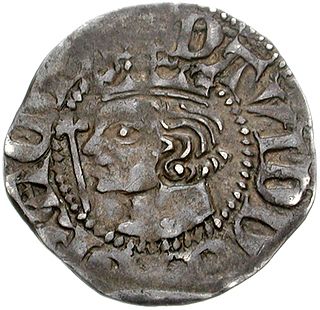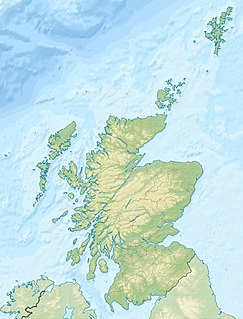| |||||
| Centuries: | |||||
|---|---|---|---|---|---|
| Decades: | |||||
| See also: | List of years in Scotland Timeline of Scottish history 1333 in: England • Elsewhere | ||||
Events from the year 1333 in the Kingdom of Scotland .
| |||||
| Centuries: | |||||
|---|---|---|---|---|---|
| Decades: | |||||
| See also: | List of years in Scotland Timeline of Scottish history 1333 in: England • Elsewhere | ||||
Events from the year 1333 in the Kingdom of Scotland .
Year 1333 (MCCCXXXIII) was a common year starting on Friday of the Julian calendar.

The Wars of Scottish Independence were a series of military campaigns fought between the Kingdom of Scotland and the Kingdom of England in the late 13th and early 14th centuries.

David II was King of Scotland for nearly 42 years, from 1329 until his death in 1371. He was the last male of the House of Bruce. Although David spent long periods in exile or captivity, he managed to ensure the survival of his kingdom and left the Scottish monarchy in a strong position.

The Battle of Halidon Hill took place on 19 July 1333 when a Scottish army under Sir Archibald Douglas attacked an English army commanded by King Edward III of England and was heavily defeated. The year before, Edward Balliol had seized the Scottish Crown from five-year-old David II, surreptitiously supported by Edward III. This marked the start of the Second War of Scottish Independence. Balliol was shortly expelled from Scotland by a popular uprising, which Edward III used as a casus belli, invading Scotland in 1333. The immediate target was the strategically important border town of Berwick-upon-Tweed, which the English besieged in March.

John Randolph, 3rd Earl of Moray was an important figure in the reign of David II of Scotland, and was for a time joint Regent of Scotland.

This page is concerned with the holders of the forfeit title Earl of Douglas and the preceding feudal barons of Douglas, South Lanarkshire. The title was created in the Peerage of Scotland in 1358 for William Douglas, 1st Earl of Douglas, son of Sir Archibald Douglas, Guardian of Scotland. The Earldom was forfeited by James Douglas, 9th Earl of Douglas, in 1455.
The Battle of Holmedon Hill or Battle of Homildon Hill was a conflict between English and Scottish armies on 14 September 1402 in Northumberland, England. The battle was recounted in Shakespeare's Henry IV, part 1. Although Humbleton Hill is the modern name of the site, over the centuries it has been variously named Homildon, Hameldun, Holmedon, and Homilheugh.

The Guardians of Scotland were regents who governed the Kingdom of Scotland from 1286 until 1292 and from 1296 until 1306. During the many years of minority in Scotland's subsequent history, there were many guardians of Scotland and the post was a significant constitutional feature in the course of development for politics in the country.
Hugh [probably Gaelic: Aodh], was the third successor of Ferchar mac in tSagairt as Mormaer of Ross (1323–1333).
Archibald Douglas may refer to:

The Battle of Culblean was fought on 30 November 1335, during the Second War of Scottish Independence. It was a victory for the Scots led by the Guardian, Sir Andrew Murray over an Anglo-Scots force commanded by David III Strathbogie, titular Earl of Atholl, and a leading supporter of Edward Balliol.
Sir Archibald Douglas was a Scottish nobleman, Guardian of Scotland, and military leader. He is sometimes given the epithet "Tyneman", but this may be a reference to his great-nephew Archibald Douglas, 4th Earl of Douglas.

Clan Haig is a Lowlands Scottish clan.

Clan Sandilands is a Scottish clan. It is also considered a sept of the larger Clan Douglas.
Sir William Douglas, Lord of Liddesdale was also known as the Knight of Liddesdale and the Flower of Chivalry. He was a Scottish nobleman and soldier active during the Second War of Scottish Independence.
Hugh the Dull was Lord of Douglas, a Scottish nobleman and cleric.

Kenneth de Moravia was the 4th Earl of Sutherland and chief of the Clan Sutherland, a Scottish clan of the Scottish Highlands.
Alexander Bruce, Earl of Carrick was an illegitimate son of Edward Bruce, Earl of Carrick, younger brother of King Robert the Bruce, and Isabella, daughter of John de Strathbogie, 9th Earl of Atholl. According to The Brus they were married, but The Scots Peerage points out that this is unlikely because he did not immediately inherit his father's lands and titles, Freedom's Sword also says he was illegitimate.
John Campbell, Earl of Atholl was a Scottish nobleman.

Sir John Stewart, the brother of Sir James the 5th High Steward of Scotland, was a Scottish knight and military commander during the First Scottish War of Independence.